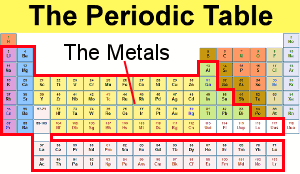Whether or not a substance is a metal can be judged by considering its properties. Judgments are best formed by considering a range of properties rather than a single property.


Elements that form cations (positively charged ions) when their compounds are in solution are metals.
Elements and their oxides that form bases rather than acids in water are metals.
A simple way to establish if an element is metallic is to consult the periodic table, where the metals are usually clearly identified by color coding.
Not all metals are elements, however. Alloys such as steel and brass are also common metals.
Metals have a range of properties. The following are generalizations:
• Most metals are very good conductors of electricity and heat.
• Most are crystalline solids at room temperature with a shiny, metallic luster.
• Most are malleable (can be beaten into a sheet without breaking easily) and ductile (can be drawn into a wire without breaking easily).
• Most are hard and have high physical strength.
• Most are denser than water.
Some care must be taken in forming judgments, because an element's properties can change under different conditions. Hydrogen, for example, is a non-metal under normal conditions on Earth. In Jupiter's interior, however, under enormous pressure, hydrogen becomes a liquid metal.
